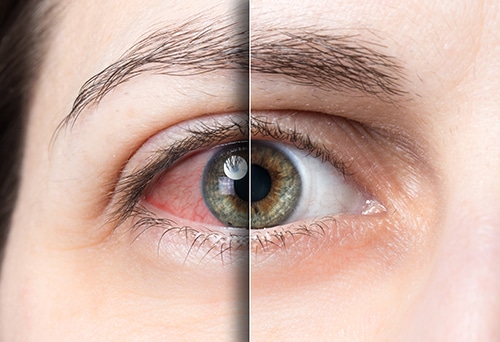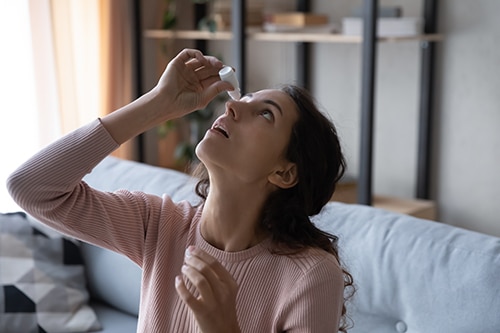Dry Eye
A healthy, normal eye constantly produces tears to keep itself moist and comfortable. Dry Eye is a condition that causes the eye to not produce enough tears, or to produce tears of the wrong composition to maintain eye health and good vision.
What Causes Dry Eye?


Certain autoimmune diseases, such as rheumatoid arthritis or lupus, can affect the tear glands or ducts, causing the decrease in tear production responsible for Dry Eye. There are also several commonly available medications that reduce tear production, leading to Dry Eye.
Anything that decreases sensation in the cornea, such as diabetes, wearing contacts for extended periods, or some eye surgeries (such as LASIK), can also cause a decrease in tear production and Dry Eye.
Sometimes Dry Eye is simply the result of exposure to environmental conditions like air conditioning, an arid climate, windy conditions, or smoke.
But the most common cause of Dry Eye Syndrome in women is the change in hormones associated with menopause, which often decreases the rate of tear production.
Vitamin A deficiency in the diet, and certain conditions like pemphigoid and Stevens-Johnson syndrome can cause Dry Eye, but these are rare.
How Common Is Dry Eye?
Anyone can experience symptoms of Dry Eye. People who spend a lot of time looking at computer monitors, tablets, and smart phones tend to blink less often when they’re staring at their screens, which makes them more likely to develop Dry Eye. The increasing prevalence of these devices is making Dry Eye more common.
Due to hormonal fluctuations caused by pregnancy, menstruation and menopause, Dry Eye is still more common among women.
How Is Dry Eye Treated?
The most common methods for treating Dry Eye are:
- Non-Prescription Artificial Tears
- Prescription Medications
- Tear Duct Plugs
- Avoiding Warm, Dry Conditions
- Avoiding Smoky Rooms
- Humidifiers
- Diet or Supplements Rich in Omega-3 Fatty Acids


Can Dry Eye Cause Any Other Problems?
Normally, an eye produces tears at a slow and fairly constant rate to maintain lubrication and comfort. When dryness or a foreign substance such as smoke, dust, or pollen causes eye irritation, or when someone cries, the eye will produce tears much more rapidly. Though it seems counterintuitive, Dry Eye can cause excess tearing as a response to the discomfort of the eye being dry.
